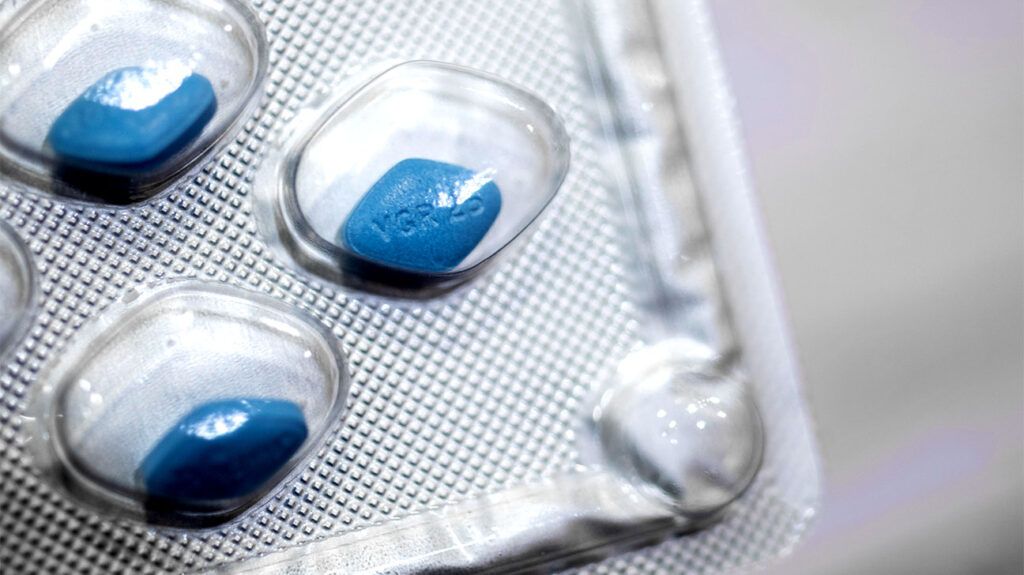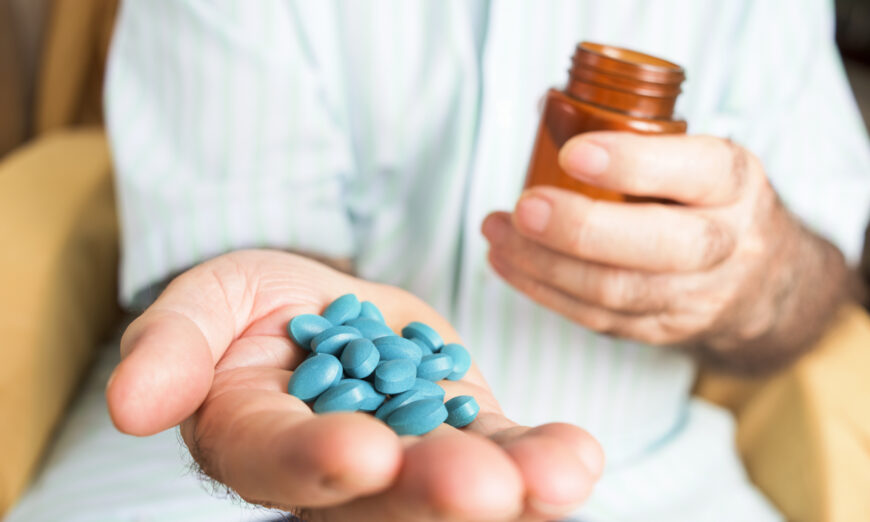
- Sildenafil, a compound in drugs that treat erectile dysfunction and one type of hypertension, could be used to prevent and treat Alzheimer’s disease, the results of a new study suggest.
- Among people who already take sildenafil, the main ingredient in Viagra, the incidence of Alzheimer’s disease was significantly less than in people who did not.
- At least one expert warned that an observational study such as this may not be telling the whole story, and should be approached with caution.
The compound sildenafil is a main ingredient in Viagra, and it forms the basis of Revatio, a medication for pulmonary arterial hypertension. Now, a new study suggests sildenafil may also help in treating Alzheimer’s disease.
Researchers, led by the Cleveland Clinic, observed a 30% to 54% reduction in the incidence of Alzheimer’s disease among people who were taking sildenafil for erectile dysfunction or pulmonary arterial hypertension, compared to those who did not.
The study is published in the Journal of Alzheimer’s Disease.
Sildenafil lowers tau levels in the brain
Alzheimer’s disease is the most common type of dementia. The Alzheimer’s Association estimatesTrusted Source that about 6.7 million Americans are living with Alzheimer’s. It is the fifth-leading cause of death in the U.S., and its prevalence is expected to rise as the population ages.
According to the Alzheimer’s Association between 2000 and 2019, deaths from stroke, heart disease, and HIV decreased, whereas reported deaths from Alzheimer’s increased more than 145%.
Alzheimer’s is a progressive disease, getting worse over time, typically beginning with memory loss and ultimately leading to difficulties communicating with others, or responding appropriately to the environment in which one finds themselves.
The authors of the new study utilized computational models to parse the data for millions of patients in two medical databases, MarketScan Medicare Supplemental and Clinformatics. In the MarketScan database, the reduction in Alzheimer’s was 54%. In the Clinformatics database, it was 30%.
After sildenafil was identified as a drug of interest from the analyzed data, further research occurred in the lab. Working with brain cells from Alzheimer’s patients, researchers found that sildenafil lowered levels of neurotoxic tau proteins. Such proteins build up in the brain as Alzheimer’s progresses.
For many years, these tau proteins were coupled with amyloid plaques as likely causes of Alzheimer’s. However, the foundational research on amyloid plaques has been discredited. Even so, neurotoxic tau proteins are still considered to be a crucial aspect of Alzheimer’s.
They also observed that neurons they had exposed to sildenafil promoted improved brain function, cell growth, and also reduced inflammation and metabolic processes associated with the cognitive degeneration that occurs with Alzheimer’s.
PDE 5 inhibitors to treat Alzheimer’s?
Sildenafil, as a treatment for erectile dysfunction, is a phosphodiesterase type 5 inhibitor, or PDE 5 inhibitor.
Dr. Ozama Ismail, Ph.D., Alzheimer’s Association director of scientific programs, who was not involved in the new study, noted that there was a recent and large UK study that suggested PDE 5 inhibitors may be able to reduce the likelihood of developing Alzheimer’s, but “there is no evidence that these drugs are able to treat Alzheimer’s disease.”
As far as the current study goes, said Dr. Ismail, “This observational study is based on electronic healthcare records and cannot determine if the connection is meaningful without further exploration.”
“Further research and specifically designed clinical trials are a necessary step before considering phosphodiesterase type 5 inhibitors for Alzheimer’s treatment.
”Such trials would need to include diverse participants — including women — to conclusively determine if this class of drug can meaningfully treat Alzheimer’s disease,” said Dr. Ismail.
He also cited as an “important limitation” of this study that Alzheimer’s was not diagnosed “using ‘gold standard’ testing that included imaging biomarkers and/or assessment at autopsy.”
If sildenafil is helpful for addressing Alzheimer’s, suggested Dr. Neil Paulvin, it may have to do with “activating [the] pakt pathway and increasing blood flow.”
The phosphatidylinositol 3-kinase (PI3K)/Akt pathwayTrusted Source is key to various cellular processes, and has been implicated in cancer, so understanding its mechanisms better could theoretically provide clues as to what occurs in Alzheimer’s.
Dr. Paulvin was likewise not involved in the study.
Safety concerns about repurposing drugs
The identification of sildenafil is an example of what may be possible with computer searches for valuable molecules. Dr. Paulvin noted such searches have turned up drugs such as “gemfibrozil [for cholesterol control], astaxanthin [an antioxidant], [and] minocycline [for treating bacterial infections].”
“This study highlights a potential new avenue for drug repurposing. Repurposing of existing, already-approved treatments can be a valuable part of drug development because, through already-completed testing, we know much about their safety and side effects. This can sometimes reduce the length and cost of studies needed for the new indication,” Dr. Ismail said.
He noted, however, that Alzheimer’s disease is especially “complex and multifaceted.” As a result,” he noted, “it is likely that combination therapies targeting different mechanisms are needed.”
“When considering repurposing an existing drug as an Alzheimer’s treatment, however, it is often important to conduct new studies over longer periods of time and in older people that reflect the diversity of individuals living with Alzheimer’s disease,” Dr. Ismail explained.
He cited the Alzheimer’s Association Part The Cloud initiative that has already invested more than $68 million supporting 65 clinical trials. These trials are aimed at “targeting various known and potential new aspects of the disease, including new and repurposed treatments for Alzheimer’s and other dementia.”
He noted that the endeavor is focusing on different pathways to treatment, such as how immune responses affect Alzheimer’s-related brain changes, the manner in which brain cells utilize energy and fuel, how they remove debris, and how the brain’s blood supply is maintained.
As regards to sildenafil, Dr. Ismail stressed that people should not use such prescription medications or over-the-counter [supplements and products similar to] phosphodiesterase type 5 inhibitors in hopes of preventing Alzheimer’s or other types of dementia based on these preliminary findings.
“Always consult your physician before starting or changing your medications,” he added.







